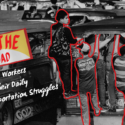
For millions of Filipino workers, the day doesn’t begin at the office—it starts on the road.
While the destination might differ, the struggle is the same: long hours in transit, overcrowded vehicles, unpredictable delays, and the exhaustion that comes from enduring it all—every single day. But the burden of commuting isn’t just physical. It’s mental, emotional, and financial, quietly chipping away at the well-being of the country’s labor force.
A System Built to Endure, Not to Thrive
The Philippines’ transportation system has long struggled to meet the demands of its commuters. Outdated infrastructure, unreliable services, and a lack of long-term investment have turned daily travel into an ordeal.
According to the Japan International Cooperation Agency (JICA), commuters in Metro Manila lose an average of 3.5 hours a day to traffic. That’s 26 days a year spent just trying to get to and from work—nearly a full month lost on the road.
Many workers leave home before sunrise and return after dark. With limited access to efficient buses, modern jeepneys, or functioning train lines, they’re left navigating an exhausting cycle—one that affects not only their performance at work but their overall quality of life.
Invisible Costs, Unheard Voices
The true cost of commuting extends far beyond fare money. It robs people of time—time that could be spent resting, sharing meals with family, or simply living.
- Physical fatigue from long hours standing in cramped vehicles
- Mental and emotional strain from uncertainty, stress, and burnout
- Financial strain, especially for those who live far from urban centers yet can’t afford to relocate
Some workers silently endure chronic fatigue, missed family moments, and emotional burnout—especially those in low-income jobs who lack the privilege of flexibility or proximity to workplaces. We often praise their resilience, but the question remains: Should survival really require this much suffering?
The Urgent Need for Change
Transportation isn’t just a commuter issue—it’s a labor issue. Without safe, accessible, and reliable public transit, the workforce cannot thrive.
What needs to happen:
- Expansion of accessible bus and train routes
- Full implementation of modernized jeepneys
- Traffic management reforms that prioritize commuters, not just cars
- Worker-centric policies that consider commute times in labor welfare
Efficient public transportation is not just a convenience—it’s a right. It empowers workers, boosts productivity, and strengthens the economy. Investing in it is investing in people.
It’s Time We Talk About the Roads
No worker should have to wake up at 3 AM to reach work by 8. No one should be expected to stand in a packed, sweltering vehicle after an already exhausting day.
Fair wages and benefits are essential, yes—but so is the journey to earn them. Transportation shouldn’t be seen as a separate concern. It’s a fundamental part of a worker’s right to a dignified life.









